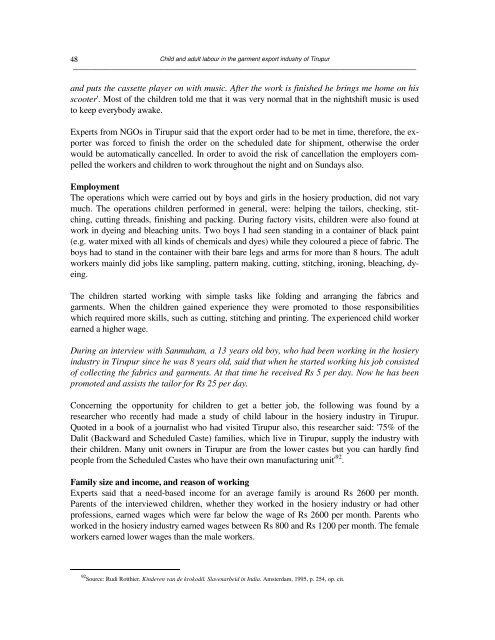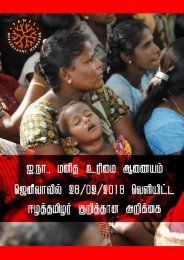Create successful ePaper yourself
Turn your PDF publications into a flip-book with our unique Google optimized e-Paper software.
48<br />
<strong>Child</strong> <strong>and</strong> <strong>adult</strong> <strong>labour</strong> <strong>in</strong> <strong>the</strong> <strong>garment</strong> <strong>export</strong> <strong>in</strong>dustry <strong>of</strong> Tirupur<br />
──────────────────────────────────────────────────────────────────────────────────────────────<br />
<strong>and</strong> puts <strong>the</strong> cassette player on with music. After <strong>the</strong> work is f<strong>in</strong>ished he br<strong>in</strong>gs me home on his<br />
scooter'. Most <strong>of</strong> <strong>the</strong> children told me that it was very normal that <strong>in</strong> <strong>the</strong> nightshift music is used<br />
to keep everybody awake.<br />
Experts from NGOs <strong>in</strong> Tirupur said that <strong>the</strong> <strong>export</strong> order had to be met <strong>in</strong> time, <strong>the</strong>refore, <strong>the</strong> <strong>export</strong>er<br />
was forced to f<strong>in</strong>ish <strong>the</strong> order on <strong>the</strong> scheduled date for shipment, o<strong>the</strong>rwise <strong>the</strong> order<br />
would be automatically cancelled. In order to avoid <strong>the</strong> risk <strong>of</strong> cancellation <strong>the</strong> employers compelled<br />
<strong>the</strong> workers <strong>and</strong> children to work throughout <strong>the</strong> night <strong>and</strong> on Sundays also.<br />
Employment<br />
The operations which were carried out by boys <strong>and</strong> girls <strong>in</strong> <strong>the</strong> hosiery production, did not vary<br />
much. The operations children performed <strong>in</strong> general, were: help<strong>in</strong>g <strong>the</strong> tailors, check<strong>in</strong>g, stitch<strong>in</strong>g,<br />
cutt<strong>in</strong>g threads, f<strong>in</strong>ish<strong>in</strong>g <strong>and</strong> pack<strong>in</strong>g. Dur<strong>in</strong>g factory visits, children were also found at<br />
work <strong>in</strong> dye<strong>in</strong>g <strong>and</strong> bleach<strong>in</strong>g units. Two boys I had seen st<strong>and</strong><strong>in</strong>g <strong>in</strong> a conta<strong>in</strong>er <strong>of</strong> black pa<strong>in</strong>t<br />
(e.g. water mixed with all k<strong>in</strong>ds <strong>of</strong> chemicals <strong>and</strong> dyes) while <strong>the</strong>y coloured a piece <strong>of</strong> fabric. The<br />
boys had to st<strong>and</strong> <strong>in</strong> <strong>the</strong> conta<strong>in</strong>er with <strong>the</strong>ir bare legs <strong>and</strong> arms for more than 8 hours. The <strong>adult</strong><br />
workers ma<strong>in</strong>ly did jobs like sampl<strong>in</strong>g, pattern mak<strong>in</strong>g, cutt<strong>in</strong>g, stitch<strong>in</strong>g, iron<strong>in</strong>g, bleach<strong>in</strong>g, dye<strong>in</strong>g.<br />
The children started work<strong>in</strong>g with simple tasks like fold<strong>in</strong>g <strong>and</strong> arrang<strong>in</strong>g <strong>the</strong> fabrics <strong>and</strong><br />
<strong>garment</strong>s. When <strong>the</strong> children ga<strong>in</strong>ed experience <strong>the</strong>y were promoted to those responsibilities<br />
which required more skills, such as cutt<strong>in</strong>g, stitch<strong>in</strong>g <strong>and</strong> pr<strong>in</strong>t<strong>in</strong>g. The experienced child worker<br />
earned a higher wage.<br />
Dur<strong>in</strong>g an <strong>in</strong>terview with Sanmuham, a 13 years old boy, who had been work<strong>in</strong>g <strong>in</strong> <strong>the</strong> hosiery<br />
<strong>in</strong>dustry <strong>in</strong> Tirupur s<strong>in</strong>ce he was 8 years old, said that when he started work<strong>in</strong>g his job consisted<br />
<strong>of</strong> collect<strong>in</strong>g <strong>the</strong> fabrics <strong>and</strong> <strong>garment</strong>s. At that time he received Rs 5 per day. Now he has been<br />
promoted <strong>and</strong> assists <strong>the</strong> tailor for Rs 25 per day.<br />
Concern<strong>in</strong>g <strong>the</strong> opportunity for children to get a better job, <strong>the</strong> follow<strong>in</strong>g was found by a<br />
researcher who recently had made a study <strong>of</strong> child <strong>labour</strong> <strong>in</strong> <strong>the</strong> hosiery <strong>in</strong>dustry <strong>in</strong> Tirupur.<br />
Quoted <strong>in</strong> a book <strong>of</strong> a journalist who had visited Tirupur also, this researcher said: '75% <strong>of</strong> <strong>the</strong><br />
Dalit (Backward <strong>and</strong> Scheduled Caste) families, which live <strong>in</strong> Tirupur, supply <strong>the</strong> <strong>in</strong>dustry with<br />
<strong>the</strong>ir children. Many unit owners <strong>in</strong> Tirupur are from <strong>the</strong> lower castes but you can hardly f<strong>in</strong>d<br />
people from <strong>the</strong> Scheduled Castes who have <strong>the</strong>ir own manufactur<strong>in</strong>g unit' 92 .<br />
Family size <strong>and</strong> <strong>in</strong>come, <strong>and</strong> reason <strong>of</strong> work<strong>in</strong>g<br />
Experts said that a need-based <strong>in</strong>come for an average family is around Rs 2600 per month.<br />
Parents <strong>of</strong> <strong>the</strong> <strong>in</strong>terviewed children, whe<strong>the</strong>r <strong>the</strong>y worked <strong>in</strong> <strong>the</strong> hosiery <strong>in</strong>dustry or had o<strong>the</strong>r<br />
pr<strong>of</strong>essions, earned wages which were far below <strong>the</strong> wage <strong>of</strong> Rs 2600 per month. Parents who<br />
worked <strong>in</strong> <strong>the</strong> hosiery <strong>in</strong>dustry earned wages between Rs 800 <strong>and</strong> Rs 1200 per month. The female<br />
workers earned lower wages than <strong>the</strong> male workers.<br />
92 Source: Rudi Rotthier, K<strong>in</strong>deren van de krokodil. Slavenarbeid <strong>in</strong> <strong>India</strong>. Amsterdam, 1995, p. 254, op. cit.


















